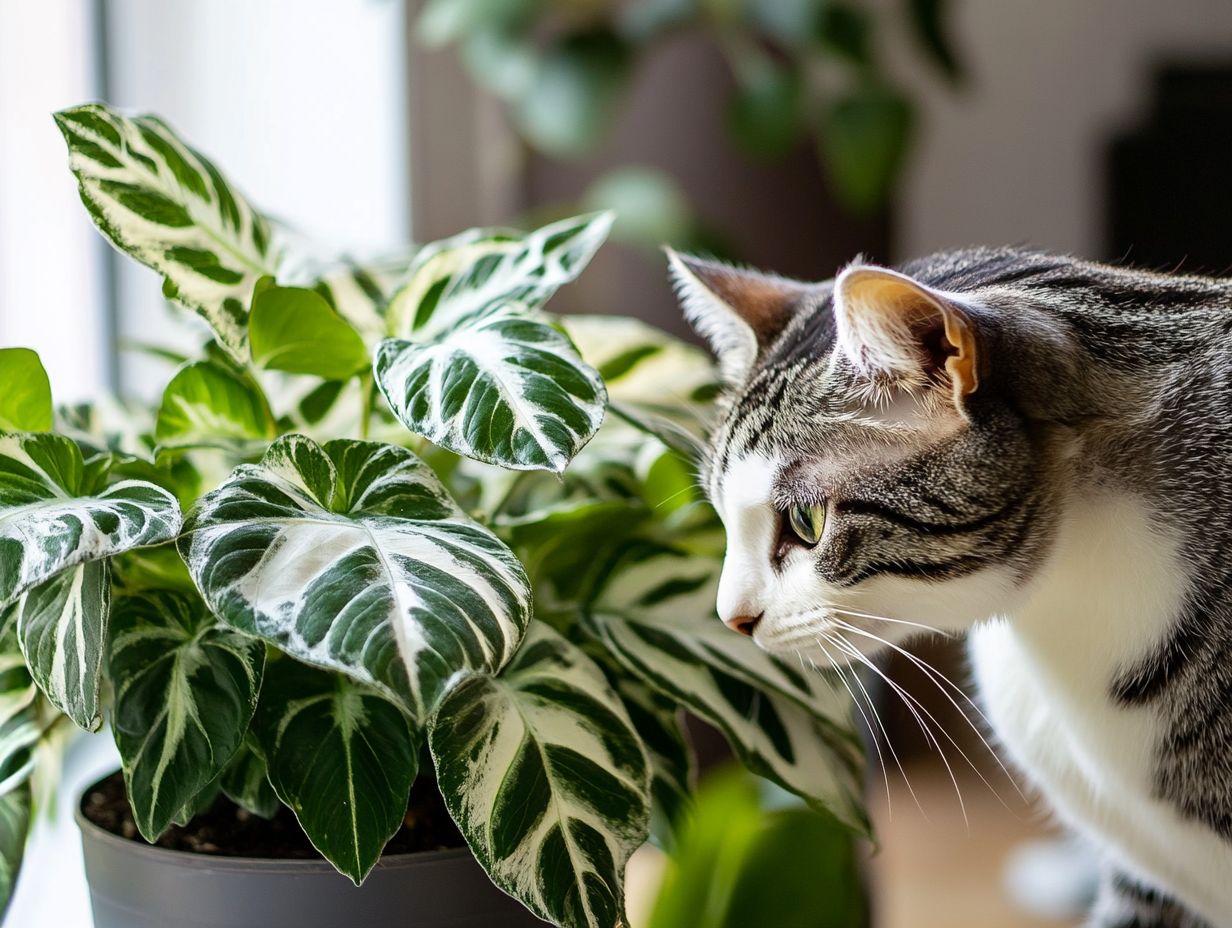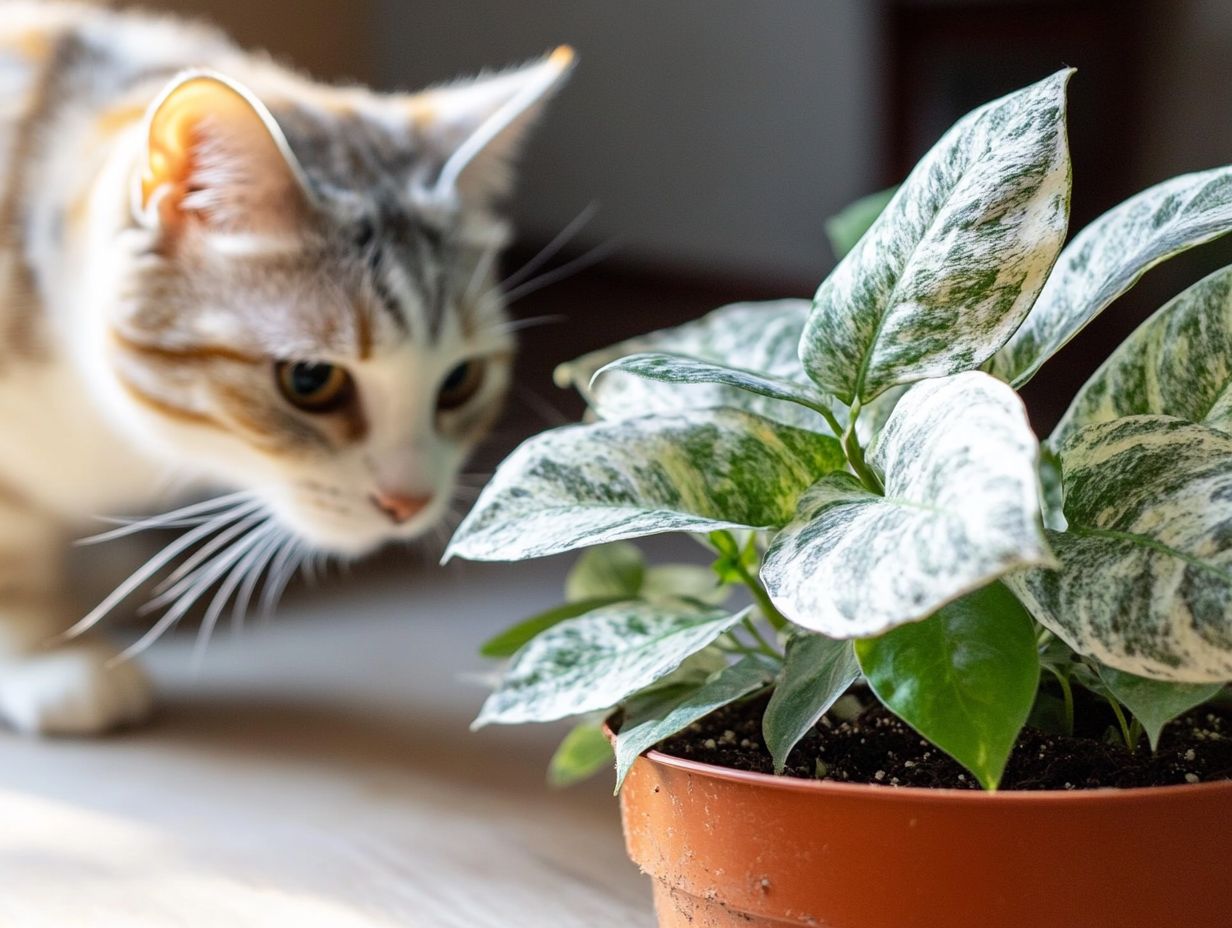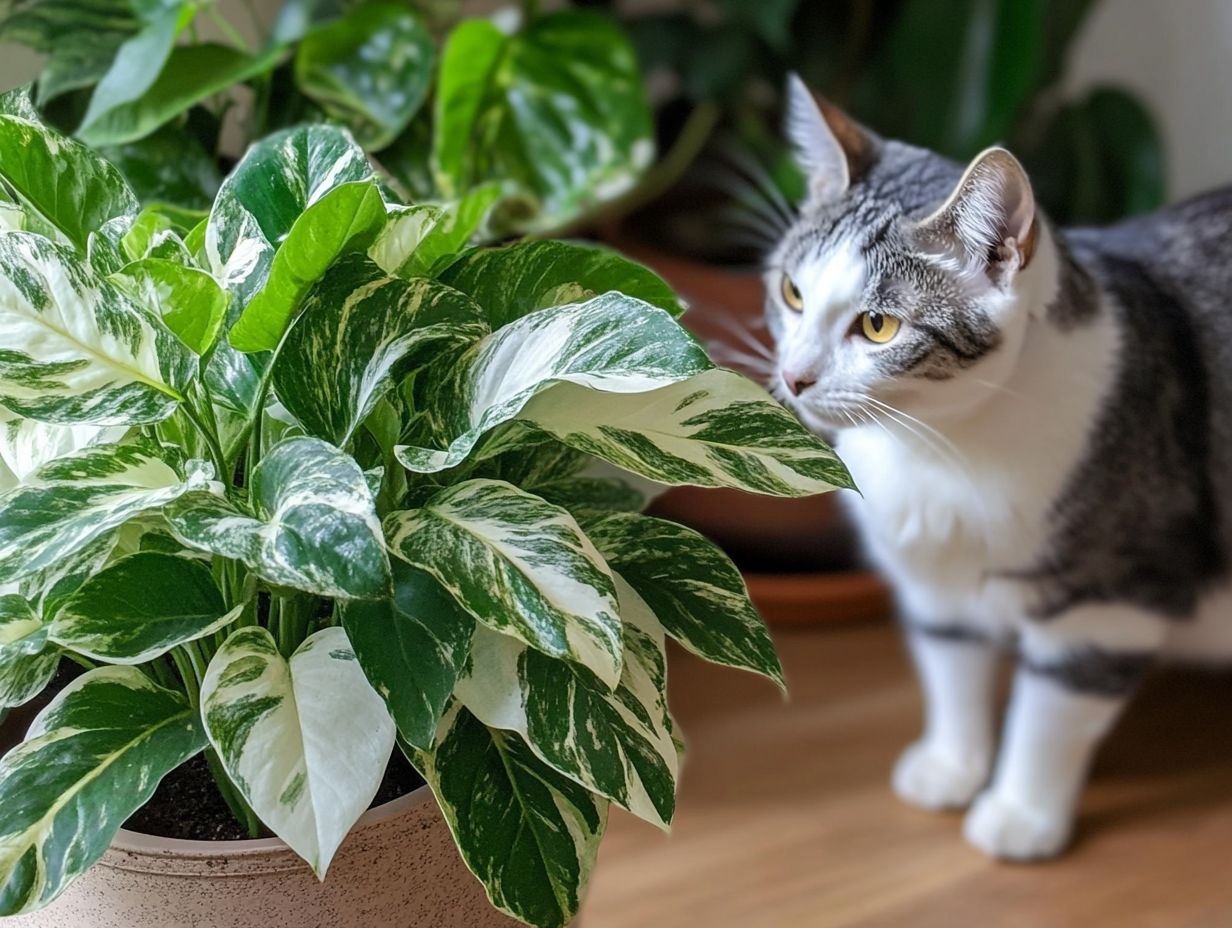Toxicity Level: Toxic – The Silver Queen plant, also known as Aglaonema commutatum, is a popular choice for house plants and indoor gardening, celebrated for its striking appearance and easy care. However, it is important to note that it contains insoluble calcium oxalate crystals, which can cause irritation and discomfort if ingested by pets, particularly cats.
If you’re a cat owner, it’s crucial to know whether this Chinese evergreen plant poses any risks to your furry friend. This article explores the potential toxicity of the Silver Queen plant to cats, outlines the poisoning symptoms of ingestion, and provides guidance on prevention and cat-friendly alternatives.
By understanding these factors, you can create a beautiful and safe environment for both your plants and pets, ensuring proper placement and safety.
Key Takeaways:

- Silver Queen Plant is a popular house plant known for its beautiful foliage and air-purifying abilities.
- It is categorized as toxic to cats if ingested, causing symptoms such as vomiting, diarrhea, and skin irritation due to insoluble calcium oxalate crystals found primarily in the leaves.
- To prevent toxicity, keep the plant out of reach of cats and opt for non-toxic alternatives such as:
- Spider plants
- Cat grass
- Boston ferns
What is Silver Queen Plant?
The Silver Queen Plant, scientifically known as Aglaonema commutatum, is a favorite among many plant enthusiasts due to its striking appearance and low maintenance requirements. This Chinese evergreen thrives in various indoor conditions, making it an ideal choice for those looking to add greenery to their living spaces.
Its lush foliage, characterized by silvery-green leaves, enhances the aesthetic of any room while also offering air-purifying benefits. However, it is essential to note that, despite its beauty, the plant can be toxic to pets, especially inquisitive cats.
Is Silver Queen Plant Toxic to Cats?
Yes, the Silver Queen Plant, also known as Aglaonema commutatum, is categorized as toxic to cats primarily due to the presence of calcium oxalate crystals in its leaves. If ingested, these crystals can lead to serious health issues for cats. It is considered moderately toxic, meaning that while it may not be immediately life-threatening, it can cause significant discomfort and health complications.
According to the ASPCA and various veterinary sources, these compounds are poisonous and can cause a variety of symptoms, potentially resulting in serious complications for curious felines.
What Are the Symptoms of Silver Queen Plant Toxicity in Cats?
The symptoms of Silver Queen Plant toxicity in cats can be categorized as follows:
- Mild Symptoms: Excessive drooling, mild gastrointestinal upset.
- Moderate Symptoms: Vomiting, diarrhea, burning pain in the mouth, difficulty swallowing.
- Severe Symptoms: Swelling of the airway leading to breathing difficulties, lethargy, decreased appetite, signs of shock.
If a cat exhibits any combination of these symptoms, pet owners should closely monitor their condition for any changes. Promptly noticing alterations in a pet’s health and contacting a veterinary surgeon can be life-saving, especially if the cat develops breathing difficulties or signs of shock. Additionally, it’s crucial to watch for any unusual lethargy or changes in normal behavior as signs of poisoning.
How to Prevent Silver Queen Plant Toxicity in Cats?
The best way to prevent Silver Queen Plant toxicity in cats is to implement multiple preventive measures, including:
- Placing the plant out of reach of curious cats.
- Using hanging planters or keeping your plants on high shelves.
- Choosing non-toxic plants to ensure harmony between your feline friend and your beautiful houseplants.
Consider safe alternatives such as:
- Spider plants
- Boston ferns
- Cat grass
What to Do If Your Cat Ingests Silver Queen Plant?

If you suspect that your cat has ingested the Silver Queen Plant, follow these first aid steps:
- Remove any remaining plant material from your cat’s mouth.
- Keep your cat calm and avoid inducing vomiting unless instructed by a veterinarian.
- Contact your veterinarian or an emergency animal poison control hotline immediately.
The sooner treatment is administered after ingestion, the better the prognosis.
Disclaimer: This information is not a substitute for professional veterinary advice. Always consult with your veterinarian for personalized recommendations.
For emergency assistance, you can contact ASPCA Animal Poison Control at (888) 426-4435.
This content will be regularly reviewed and updated as new research emerges. Last updated: [Insert Date Here].
For more information on other plants that are toxic or non-toxic to cats, check out our related articles.
Symptoms and Health Effects of Ingestion
Long-term health effects of ingestion can include chronic gastrointestinal issues and potential allergic reactions. It is crucial for pet owners to stay vigilant about their pets’ health and consult a veterinarian if symptoms persist.
Benefits of Having Houseplants
While the Silver Queen plant poses risks, many houseplants offer significant benefits, including improved air quality, reduced stress, and enhanced mood. Choosing non-toxic varieties allows you to enjoy these advantages without compromising your pets’ safety.
Frequently Asked Questions
Is the Silver Queen Plant Toxic to Cats?
Toxicity Level: Toxic – The Silver Queen Plant (Spathiphyllum) is toxic to cats. It contains insoluble calcium oxalate crystals, primarily found in its leaves, which can irritate oral tissue and cause swelling in a cat’s mouth and throat if ingested. Source: ASPCA
What are the Symptoms of Toxicity in Cats from the Silver Queen Plant?

The symptoms can be categorized as follows:
- Mild Symptoms: Excessive drooling, burning pain in the mouth.
- Moderate Symptoms: Difficulty swallowing, vomiting.
- Severe Symptoms: Swelling of the airway, difficulty breathing.
Seek immediate veterinary care if you suspect your cat has ingested this plant. Long-term health effects may occur if not treated promptly.
How Can I Keep My Cat Safe from the Silver Queen Plant?
Consider the following measures:
- Place the Silver Queen Plant in a room that your cat does not have access to.
- Use deterrents such as bitter sprays on the plant’s leaves.
- Store potentially harmful substances, such as fertilizers and pesticides, in cabinets out of reach.
What Should I Do If My Cat Has Ingested the Silver Queen Plant?
If your cat has ingested the Silver Queen Plant, follow these steps:
- Contact your veterinarian immediately.
- Do not induce vomiting unless instructed by a veterinary professional.
- Be prepared to provide information about the size and weight of your cat, as well as how much of the plant may have been ingested.
Potential treatments may include administering activated charcoal, fluids, or other supportive care as deemed necessary by the veterinarian.
Are There Any Other Plants I Should Be Aware of That Are Toxic to Cats?
Yes, many common household plants are toxic to cats, such as lilies, aloe vera, philodendron, and certain types of ferns like dumb cane. Misconceptions exist that all houseplants are safe for pets; however, many are not. It is crucial to research any new plants before bringing them into your home and consult the ASPCA for a list of cat-friendly plants.
Can I Still Have the Silver Queen Plant in My Home If I Have a Cat?
While possible, it is not recommended to have the Silver Queen Plant in your home if you have a cat, as even with precautions, accidents can happen. It is best to choose a different, non-toxic plant for your home, such as cat grass or pothos, which are safer options. Minor gastrointestinal upset can occur even with non-toxic alternatives.
Special Considerations for Vulnerable Cats
Kittens and senior cats may be at higher risk for severe symptoms due to their health status. Additionally, seasonal factors, such as holiday decorations, can introduce new plants and flowers into your home, increasing the risk of accidental ingestion.
Visual Identification of the Silver Queen Plant

For easy identification, refer to the image above.
Emergency Contact Information
For immediate assistance, contact the ASPCA Animal Poison Control at (888) 426-4435.
Disclaimer: This content is for informational purposes only and should not be considered medical advice. Always consult your veterinarian for guidance on animal health issues. Regularly review and update this information to ensure accuracy.